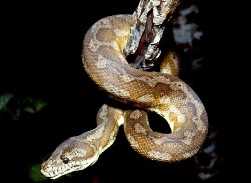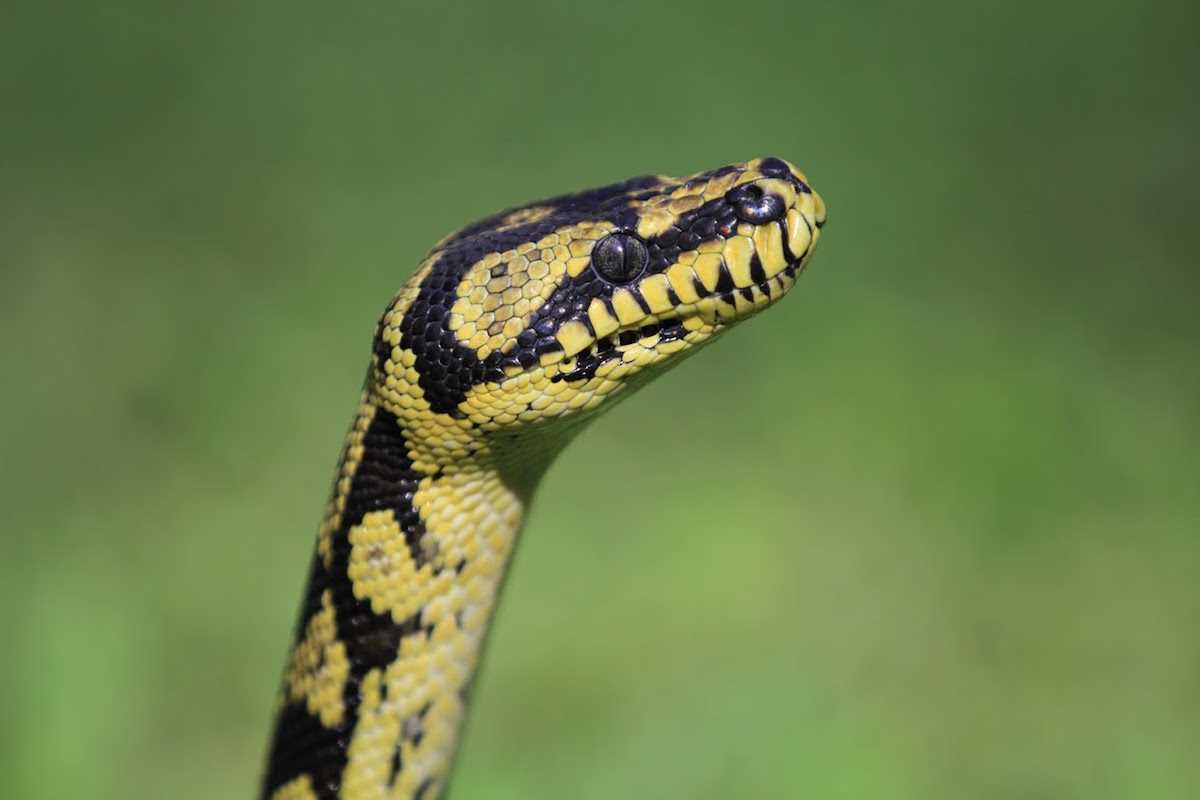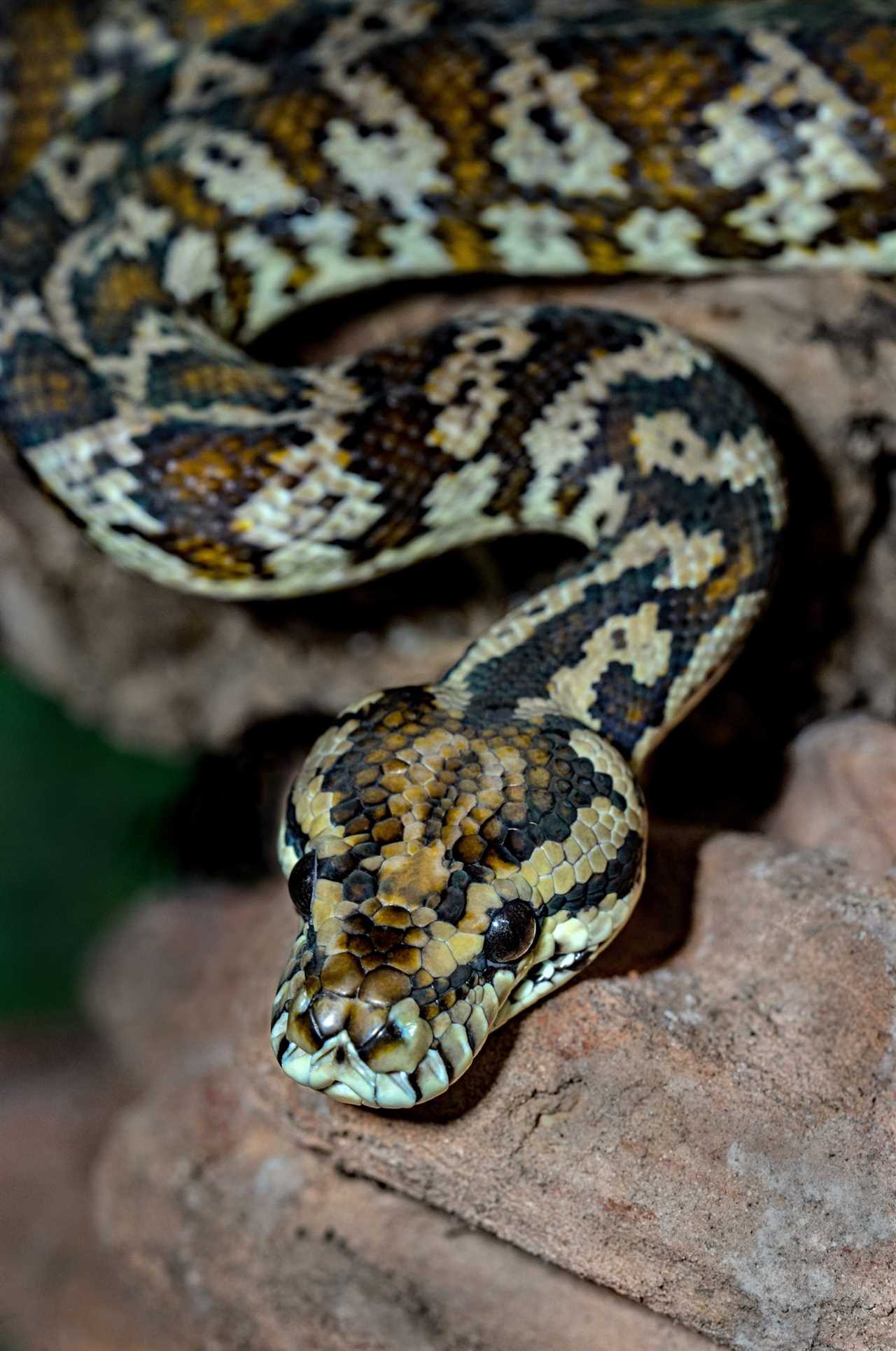Carpet pythons are a species of snake that often provokes fear and fascination due to their large size and striking appearance. Despite their fearsome reputation, these pythons are generally not harmful to humans and are not venomous.
While their size may be intimidating, carpet pythons are not naturally aggressive towards humans. They are primarily ambush predators, relying on their camouflage to hide and wait for prey to pass by. They have a calm and docile temperament, making them popular pets among snake enthusiasts.
Carpet pythons have a natural instinct to constrict their prey. This means they wrap their bodies around their prey and squeeze, cutting off their blood circulation and causing them to suffocate. However, this behavior is not directed towards humans and is only seen when they are hunting for food.
Risks of Keeping Carpet Pythons as Pets
Carpet pythons are constricting snakes, meaning that they wrap their bodies around their prey and squeeze until it suffocates. While they do not typically pose a threat to humans, accidents can happen, especially when interacting with a large and powerful snake. It is crucial to approach and handle them with caution to avoid any potential injuries.
One of the main risks of keeping carpet pythons as pets is their potential to become aggressive. Although they are generally docile, they still have the capacity to act defensively if they feel threatened or provoked. This aggression can manifest in hissing, striking, or biting, which can result in painful wounds or infections.
Additionally, carpet pythons have specific dietary requirements. They are carnivorous and primarily feed on small mammals, birds, and occasionally reptiles. Feeding them a diet that does not meet their nutritional needs can result in malnutrition and health issues.
Furthermore, carpet pythons can grow quite large, reaching lengths of up to 13 feet or more. This means that they require a significant amount of space and may not be suitable for individuals with limited living arrangements. Properly housing and managing a large snake like a carpet python requires extensive knowledge, resources, and commitment.
Interacting with Carpet Pythons: Safety Precautions and Guidelines
Safety Precautions when Interacting with Carpet Pythons
When handling a carpet python, it is recommended to follow these safety precautions:
1. Always approach the snake calmly and slowly. Sudden and abrupt movements can startle the python, leading to defensive behavior.
2. Wear protective gloves to minimize the risk of a bite. Although carpet pythons are not venomous, their bite can still cause injury.
3. Do not attempt to handle a carpet python if you are inexperienced or unsure of how to do so safely. Seek guidance from a knowledgeable reptile expert.
4. Never handle a carpet python when it is shedding its skin or during feeding time. Snakes can become more agitated during these periods and may be more likely to bite.
5. Utilize proper equipment, such as snake hooks and a secure enclosure, to ensure the safety of both the snake and the handler.
6. Avoid handling a carpet python if it is displaying signs of stress, such as hissing, striking, or aggressive posturing. Give the snake space and time to calm down.
7. Keep a close eye on the snake’s body language. If it is coiled tightly, hissing, or striking repeatedly, it may be best to avoid handling it altogether.
Remember, carpet pythons are not inherently dangerous, but proper precautions should always be taken to ensure the safety of both the snake and the handler. With patience, respect, and proper handling techniques, interacting with carpet pythons can be a fascinating and rewarding experience.
Are Carpet Pythons Venomous?
One of the common fearsome misconceptions about carpet pythons is that they are venomous. However, this is not true. Carpet pythons are non-venomous snakes that do not possess venomous glands or fangs for injecting venom. They rely on their impressive size, strength, and constricting abilities to subdue their prey.
While carpet pythons may not be venomous, they can still deliver a bite. Like any snake, they have sharp teeth that they use to grab their prey and hold on. If a carpet python feels threatened or cornered, it may resort to biting as a form of defense. The bite of a carpet python can be painful and could potentially lead to infection if not properly cleaned and treated.
Handling Carpet Pythons: Best Practices and Techniques
Safety Precautions
It is also important to handle the snake with confidence and control. This means maintaining a firm grip on the snake’s body, being careful not to squeeze too tightly, as this can cause stress or harm to the snake.
Proper Technique
Building Trust
Handling carpet pythons should not be done as a means of display or dominance. Instead, it should be seen as an opportunity to build trust and establish a bond with the snake. By handling the python gently and consistently, they can become more comfortable with human interaction over time.
Common Misconceptions about Carpet Pythons
Carpet pythons are often misunderstood and have gained a reputation for being dangerous and aggressive. However, many of these perceptions are based on misconceptions and myths rather than factual information. In reality, carpet pythons are generally gentle and docile creatures that pose little threat to humans.
One of the most common misconceptions about carpet pythons is that they are venomous. This is entirely false. Carpet pythons are constricting snakes, meaning that they subdue their prey by wrapping their bodies around them and squeezing tightly until the prey suffocates. They do not possess venom or fangs to inject venom into their prey or defend themselves.
Another misconception is that carpet pythons are aggressive and prone to biting humans. While carpet pythons may bite if they feel threatened or cornered, they do not actively seek out human interaction. They are naturally shy and prefer to avoid confrontation whenever possible. Biting is usually a last resort for them, and it is a defensive behavior, rather than an aggressive one.
Some people may also mistakenly believe that carpet pythons are harmful to the environment or ecosystem. However, in their natural habitat, carpet pythons play an important role as predators. They help control the population of rodents and other small mammals, which can have a positive impact on the ecosystem.
Carpet Pythons in the Wild: Their Natural Habitat and Role in the Ecosystem
Carpet pythons are fascinating creatures that inhabit a wide range of environments across the world. Found in various parts of Australia, Indonesia, and Papua New Guinea, these snakes have adapted to different habitats such as forests, woodlands, grasslands, and even urban areas.
These pythons play an essential role in the ecosystem by controlling rodent populations, which helps maintain a balanced prey-predator relationship. They are opportunistic hunters and possess remarkable camouflage, allowing them to blend seamlessly into their surroundings while patiently waiting for their unsuspecting prey.
Adaptations for Survival
Carpet pythons have evolved several adaptations that aid in their survival. Their large size and muscular bodies enable them to overpower and constrict their prey, suffocating it before consuming it whole. They have a heat-sensing organ called the pit organ, located between their nostrils and eyes, which allows them to detect warm-blooded prey in complete darkness.
These snakes are not venomous but rely on their powerful constricting abilities to subdue their prey. Their sharp teeth are used to grip and hold onto their prey while they wrap their bodies around it. This method of hunting ensures that the prey cannot escape and minimizes the risk of injury to the snake.
Behavior and Interaction
Despite their fearsome appearance, carpet pythons are generally not aggressive towards humans unless they feel threatened or cornered. In the wild, they prefer to avoid human contact and will usually retreat if given the opportunity. However, if provoked or handled improperly, they may bite in self-defense.
It is essential to approach carpet pythons with caution and respect, both in their natural habitat and in captivity. When encountering a carpet python in the wild, it is best to observe from a safe distance and avoid disturbing or provoking the snake.
Summary
Carpet Pythons and Humans: Conflicts and Encounters
Carpet pythons, although not inherently harmful to humans, can still cause concerns due to their size and behavior. These fearsome creatures have been the subject of numerous misconceptions, leading to unwarranted fears about their interactions with humans.
Constricting and Biting

One of the main concerns people have about carpet pythons is their ability to constrict and potentially bite humans. While it is true that carpet pythons are constrictors and use constriction to subdue their prey, they rarely pose a threat to humans. Constricting is a natural behavior for these snakes, and when interacting with humans, they typically use their constriction as a form of exploration rather than aggression.
Venomous or Non-venomous?

Another common misconception about carpet pythons is their venomous nature. However, it is essential to note that carpet pythons are non-venomous snakes. They do not possess venom glands or fangs. Their method of hunting and killing relies solely on their powerful constricting abilities. Therefore, there is no risk of venomous bites from carpet pythons.
Aggression and Handling
Carpet pythons are generally non-aggressive towards humans. However, like any wild animal, they may exhibit defensive behaviors when feeling threatened or cornered. It’s crucial to approach carpet pythons with caution and respect their space. Proper handling techniques should be followed to minimize stress on both the snake and the handler.
Encountering Carpet Pythons

- Do not attempt to capture or handle a wild carpet python unless you are a trained professional.
- If you have a pet carpet python, ensure suitable enclosures and environmental conditions to minimize stress and potential aggression.
- If you come across a carpet python in your home or backyard, contact local wildlife authorities or snake removal experts for assistance.

I’m Lena Adams—a product of an unconventional upbringing in the African wilderness. My father, a daring explorer of African wildlife, sparked my fascination with reptiles, a passion that intertwined with the tragic loss of my mother during an expedition, leaving an indelible mark on my life. Driven to understand the creatures that captivated my parents, I embarked on my journey, sharing insights about reptiles, frogs, and lizards on my website. Through my explorations and conservation efforts, I honour my family’s legacy while seeking connections—to the creatures, nature, and the mother whose presence I yearn to understand.
